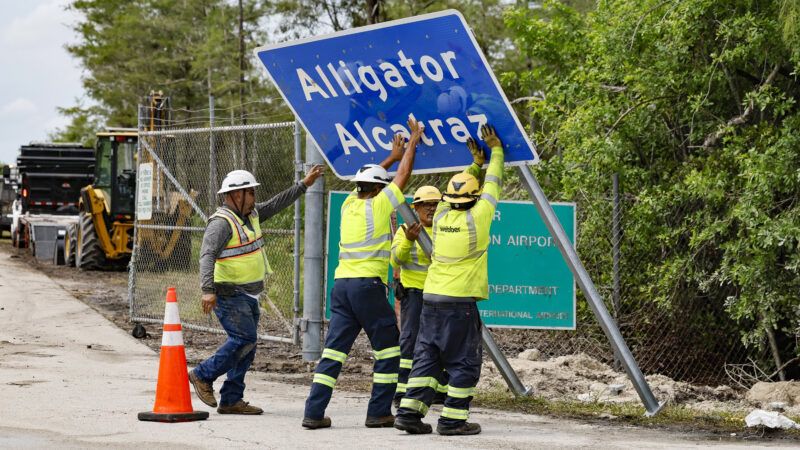Florida Applies for Federal Reimbursement for 'Alligator Alcatraz' Costs Despite Court Warning
Florida Gov. Ron DeSantis promised that the federal government would reimburse the state for the costs of "Alligator Alcatraz," but doing so would make the detention facility subject to environmental reviews Florida ignored.

The state of Florida has asked the federal government to reimburse it for the costs of its "Alligator Alcatraz" immigrant detention camp, despite a recent appeals court ruling that receiving federal funds would trigger environmental reviews that the state ignored when it hastily built the camp.
"The State of Florida submitted an application for reimbursement to the Federal Emergency Management Agency (FEMA)," a Department of Homeland Security (DHS) spokesperson says. "FEMA has roughly $625 million in Shelter and Services Program funds that can be allocated for this effort."
Last week, the U.S. Court of Appeals for the 11th Circuit lifted a lower court's preliminary injunction shutting down the Everglades detention camp, allowing operations there to resume. It was a victory for Florida Republican Gov. Ron DeSantis, but it also complicated the state's plan to be reimbursed by the federal government for hundreds of millions of dollars in expenses, as DeSantis repeatedly promised would happen.
The appeals court panel ruled, in response to a lawsuit by the environmental advocacy nonprofits Friends of the Everglades and the Center for Biological Diversity, that the detention camp is not subject to environmental impact studies required by the National Environmental Policy Act (NEPA) because it has so far been entirely paid for by the state of Florida.
"Here, no federal dollars have been expended on the construction or use of the Facility," Judge Barbara Lagoa wrote in the majority opinion. "So, the Florida-funded and Florida-operated detention activities occurring at the Site do not conceive a 'major federal project' either."
"There may come a time when [the Florida Department of Environmental Protection] applies for FEMA funding," Lagoa continued. "If the Federal Defendants ultimately decide to approve that request and reimburse Florida for its expenditures related to the Facility, they may need to first conduct an [environmental impact statement]. But, having not yet formally 'committed to funding that project,' the Federal Defendants have taken no 'major federal action' subjecting them to the procedural requirements of NEPA."
As the Associated Press reported Wednesday, the ruling created an apparent predicament for the state: "The state can either pass up federal reimbursement for hundreds of millions of dollars spent to build and operate the facility, or take the money and face an environmental review, which would risk halting the center's operations," the A.P. reported.
But Florida has already applied for such funding, according to DHS' statement to Reason.
DHS and FEMA did not respond to requests for a copy of Florida's application. No funds are reported to have been disbursed yet.
DeSantis' office did not respond to a request for comment. The Florida Division of Emergency Management (FDEM), which is the state agency in charge of the detention camp, responded by sending a link to a DeSantis press conference from last month.
Friends of the Everglades argues that, although no money has changed hands, the tacit agreement between the federal government and the state of Florida, and the repeated public statements by Florida and DHS officials, clearly show that the federal government has committed to pay for the project.
In a dissenting opinion, Judge Adalberto Jordan agreed, writing that "the notion that Florida decided to build the detention facility without a concrete funding commitment from the federal government is squarely contradicted by the preconstruction statements of [DHS] Secretary [Kristi] Noem and Governor DeSantis that the United States will pay for the facility."
Friends of the Everglades says Florida's reimbursement application only adds to the pile of evidence that the federal government has always intended to pay for the project.
"Time will prove the trial judge and Judge Jordan correct—and this evidence will support our case when we return to the trial court," says Paul Schwiep, the lead counsel for Friends of the Everglades in its lawsuit.
Federal and Florida officials have had a tacit reimbursement agreement for months.
In a June 20 email, disclosed last month in a court filing, the Trump administration's nominee for DHS general counsel, James Percival, wrote to the Florida Attorney General's Office regarding Florida's plan to detain aliens under an agreement with the federal government. "If you go forward, we will work out a method of partial reimbursement," Percival wrote.
At a June 25 press conference, DeSantis said the federal government would fully reimburse Florida. "This is something that was requested by the federal government, and this is something that the federal government is going to fully fund," DeSantis said. "From a state taxpayer perspective, we are implementing it…but that will be fully reimbursed by the federal government."
Noem also said in public statements over the summer that FEMA funds would be used to reimburse Florida.
The FDEM estimated in August that a shutdown of the facility would cost it more than $218 million it had already invested.
